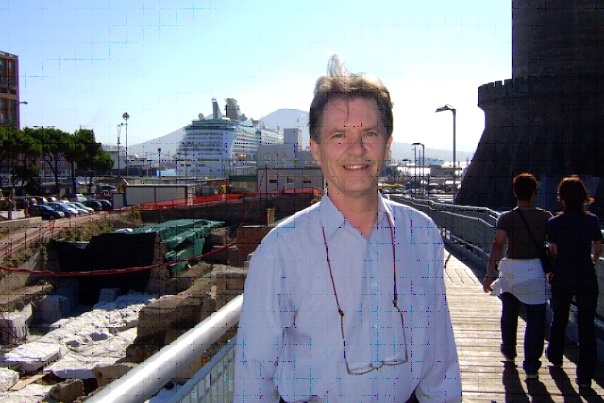Nicholas Tapp, 1952-2015
A tremendously grounded and adventurous anthropologist, Nick contracted a cancer that killed him within a year (2015), midway into yet another imaginative research project. He lived in Shanghai with his Chinese wife Jing, after joining East China Normal University in 2010 to found a Research Institute of Anthropology. He had wandered far from his English roots and from his first degree in English literature, but he remained rooted, just as he showed how fruitful and necessary it is to say both how rooted the people with whom he lived and studied are, while at the same time how much they are affected in and by their multiple identifications and dislocations. Those people, for his doctoral fieldwork, were the Hmong living in northern Thailand on the China border, in highlands to which they had been forced to migrate centuries earlier. He had visited the first at the end of his two years Voluntary Service Overseas (VSO) in Thailand, in 1976. In a speech accepting the Eagle award for his exceptional contribution to Hmong studies, which can be seen on YouTube, he describes how romantic, mysterious and attractive these highlanders seemed. He returned for fieldwork, having learned Hmong, in 1980-81.
From his 1985 dissertation in anthropology, at SOAS, the basis of his book Sovereignty and Rebellion: The White Hmong of Northern Thailand. Singapore: Oxford University Press, 1989, he kept expanding the scope of his expertise to related peoples in the same language group and high altitude locales in China and to their further dislocations from Laos and Vietnam. He worked on his own and in collaboration, particularly with the Hmong anthropologist Gary Lee with whom his sadly final projects were on the impact of the return of overseas migrants in their Asian homelands and on ethnic minority migrants in Shanghai.
From London, Nick travelled in 1986 to Hong Kong where he was a lecturer in anthropology in The Chinese University and where he began field projects among Hmong in China and with related people – the Yao and the She – in southwestern and southeastern China. He returned to the UK in 1992 to the University of Edinburgh Anthropology Department where he worked as leader of a forestry project in the highlands he already knew and now restudied, advising the UK Overseas Development Administration that these long-term swidden agriculturalists preserved the timber producing stumps in their clearings and effectively farmed them, while the over-intensive cultivation and felling in which lowland people, forced into these uplands by population pressure, engaged were the culprits of the destruction that was blamed on the seasoned highlanders. At the same time, the same forces of population and cash-cropping pressure were forcing the highlanders to cultivate sellable crops, not just timber but fruit trees just as their predecessors over the past century in China and the golden triangle (Thailand, Laos, Burma) had been encouraged to grow opium and now added heroin processing. This emphatically grounded work was also, evidently, about changing senses of the land with which the highlanders identified themselves and the reputations of those highlanders among the other peoples with whom they lived and the state officials with whom they had to deal.
These changing senses of belonging and differentiation, celebrated in clothing, shamanic possession, songs, language, and the geomancy they appropriated from China were the main focus of Nick’s work. Anyone interested in the processes of identification as a ‘people’, or ethnogenesis, will be well rewarded by reading his publications. They explore the impact not only of Christian missionaries but also of culture officials and anthropologists, including himself, mobilizing some of their subjects into a wider self-consciousness of why they are interesting, or that their own egalitarian pride and highland habitats are romanticized by some of the more benign power-holders who ‘know’ them. In the other direction, the exploitation of their own local knowledge by both sides in the Indochina war not only divided them further, as Christian conversion already had, but forced those exploited by the defeated CIA to be airlifted out to the US and to Australia from Laos and Vietnam. These were the diasporas that Nick then studied as Senior Fellow in Anthropology at the Australian National University from 2000, when he retired and became Emeritus Professor in 2010, moving to East China Normal University, Shanghai.
The book that addresses all these, often contradictory pressures of identification to great effect is The Impossibility of Self; an essay on the Hmong diaspora. Berlin: Lit Verlag, 2010. It is written for a general anthropological readership and argues the coherence of a spiritual and spirited Hmong collection of selves and dread of the loss of spirit with their dispersal is congruent with the Romantic self and its antecedents in European traditions. A daring argument for similarity rather than contrast. Typically, he was extending his purview and his insights ever further with his most recent projects and we can look forward to some of the results in publications by his collaborator Gary Lee.
Nick’s ashes will be returned from Shanghai to his UK roots. He is survived by his wife Jing and their two young adult children, Jeremy and Amanda Tapp, and by his sister Caroline.

Nicholas Tapp. Photograph by Felicia Hughes-Freeland. EUROSEAS Conference, Naples 2007.
STEPHAN FEUCHTWANG
To cite this article:
FEUCHTWANG, S. 2015. ‘Nicholas Tapp, 1952-2015’. Obituaries. Royal Anthropological Institute, 23 November 2015. (available on-line: http://www.therai.org.uk/archives-and-manuscripts/obituaries/nicholas-tapp).
Related:
TURTON, ANDREW. 2016. Nicolas Tapp (1952-2015). Anthropology Today 32, 1: 26.
Link to relevant records by or concerning the listed person on the RAI’s bibliographic database Anthropological Index Online https://aio.therai.org.uk/aio.php?action=doadvancedsearch&filter=*&cw=OR&as_method=get&as_resultsmode=fullkeywords&f0=author&o0=%3D%3D&v0=Nicholas%20Tapp&f1=author&o1=%3D%3D&v1=N%20Tapp&f2=title&o2=CT&v2=Nicholas%20Tapp

